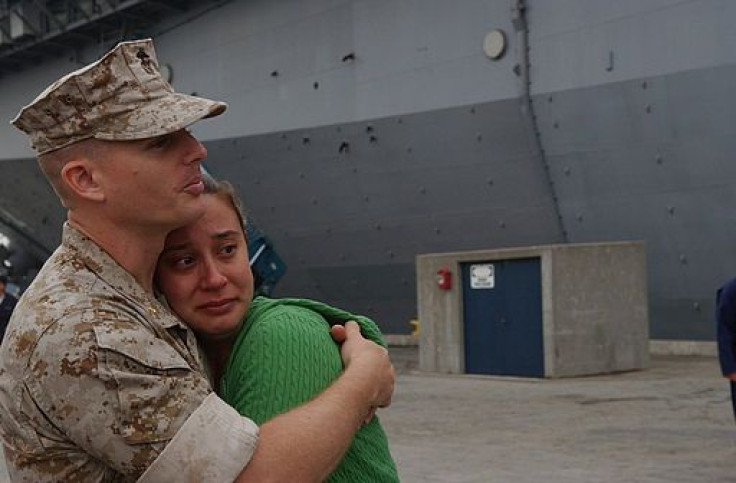Combat Vets’ PTSD Symptoms Raise Spouses and Partners' Blood Pressure

PTSD symptoms can be debilitating for combat veterans, but a new study finds that military service members' posttraumatic stress disorder can have negative mental and physical health effects on their spouses and partners as well.
The study, conducted at the University of Utah, compared the emotional and physiological responses of two groups of military veterans and their partners during and after a "disagreement task" in a clinical environment. One of groups had combat veterans diagnosed with PTSD, and the other group served as a control with no PTSD.
Surprisingly, the physiological data showed that the female partners and spouses of veterans with PTSD had even greater increases in blood pressure than the combat veterans themselves. The couples affected by PTSD also showed higher heart rates and other indicators of cardiovascular health risk than the control group.
This suggests that the partners and spouses of combat veterans with PTSD are at a similar risk for negative health consequences, since they may face constant relationship stress and possible secondary PTSD symptoms.
The University of Utah study results will be presented in late March at the annual meeting of the American Psychosomatic Society.
PTSD is an anxiety disorder that can follow a traumatic event. Almost one out of four of the 2 million combat veterans returning from Iraq in Afghanistan have been diagnosed with PTSD symptoms, which include hypervigilance, avoidance, and constantly reliving traumatic memories in nightmares and flashbacks.
PTSD is highly associated with increased risk of cardiovascular disease, including stroke, hypertension, and heart disease, as well as relationship conflict between couples. Since the societal and economic costs are so high, PTSD is a major focus of federal research.
It has been well documented that combat veterans with PTSD have higher levels of anger and cardiovascular reactivity to stressors, but the physical effects of relationship stress on their partners and spouses have not been previously documented.
This is the first study to report physiological anger responses to relationship stress in both veterans with PTSD and their partners.
"We learned that couples with PTSD experience more signs of physical and emotional stress than other military couples when under a challenge to their relationship," says Tim Smith, professor of psychology at the University of Utah, and a co-author on the study.
The study was conducted on 65 male combat veterans and their female partners. There were 32 couples in which the veteran had PTSD, and 33 couples in the control group without PTSD. All the veterans had been deployed to Iraq or Afghanistan an average of 1.5 times since 2001. The researchers also looked for female veterans with male partners, but did not find any who were willing to participate.
The participants participated in clinical interviews that measured PTSD, depression, anger and anxiety, marital satisfaction, and areas of disagreement.
For each couple, the topic area of highest disagreement led to a laboratory conflict task in which they discussed the problematic issue in a structured and timed conversation. The participants' blood pressure and heart rate were measured before, during, and after the conflict task. Afterward, each participant completed questionnaires and were interviewed about their feelings without their partner or spouse present.
As expected, the couples with PTSD were under greater stress than those without, and showed higher levels of emotional distance and more frequent conflict.
Overall, the PTSD couples reported greater increases in anxiety and anger after the conflict task, and the female partners and spouses of combat veterans with PTSD showed even greater anger responses than their partners, as well as higher blood pressure.
"The results of our study emphasize the potential role of relationship difficulties in the increased risk for cardiovascular disease among Iraq and Afghanistan War veterans with PTSD," concludes Catherine Caska of the Univeristy of Utah.
"These data also suggest the possibility of similar heath risks for their partners. These findings could have important implications for the focus of treatments and services for this population, and further drives home the need to continue to focus research and resources on understanding and better serving military families."
Many veterans' hospitals include support groups and couples therapy for the spouses and partners of combat veterans with PTSD, and the Department of Veterans Affairs has a support page with more information: Partners of Veterans with PTSD.



























